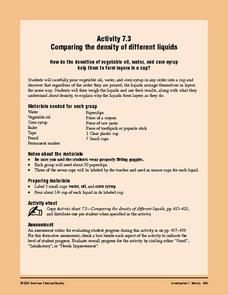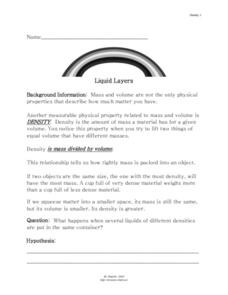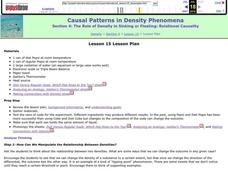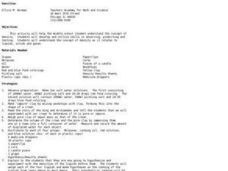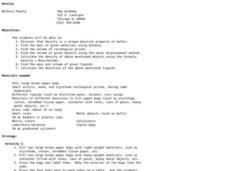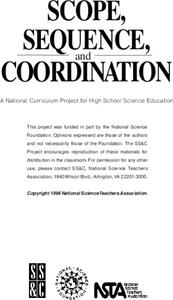American Chemical Society
Comparing the Density of Different Liquids
Learners will like making a liquid layer cake to investigate the relative densities of various liquids: water, oil, and corn syrup. They will also introduce a few solid materials to find out how their densities compare. Standing alone,...
American Chemical Society
The Density of Liquids
It's in your destiny to study density! Young scientists conduct an experiment to study the relationship between weight and density. They compare weights of liquid samples of different substances and predict how their densities are...
American Chemical Society
Density: Sink and Float for Liquids
We don't think of liquids as floating typically, but a quick look at any oil spill tells a different story. Lesson explores various densities of liquids and why this fact is important. After observing the density variation, scholars...
Kenan Fellows
Density
Most scholars associate density with floating, but how do scientists determine the exact density of an unknown liquid? The third lesson in a seven-part series challenges scholars to find the mass and volume of two unknown liquids. Each...
Curated OER
Specific Gravity-The Relative Density of Liquids
Students explore a hydrometer. In this gravity lesson students construct a hydrometer and create a liquid density column.
Curated OER
Galileo's Thermometer: Measuring the Density of Various Unknown Liquids
Sprouting scientists explore the concept of density by making mass and volume measurements for five different liquids. From these measurements, they calculate densities. They apply their learning to explain Galileo's thermometer works...
Teach Engineering
Density and Miscibility
The liquids did not mix — so what do density columns have to do with it? The seventh part in a series of nine provides the theoretical explanation of why density columns do not mix. The lesson covers the topics related to...
NorthEast Ohio Geoscience Education Outreach
Density and Pressure of a Hot Air Balloon
Using a dry cleaner bag and a blow dryer, create a hot air balloon! The materials list suggests obtaining one dry cleaner bag per student, but since this is probably inconvenient, consider doing this as a demonstration during a lesson on...
Curated OER
The Role of Density in Sinking or Floating: Relational Causality
Pupils consider density and how it affects sinking and floating. Students make predictions, test liquids, and observe why some liquids sink and others float. They perform experiments to determine relational causality and how liquids...
Curated OER
Liquid Layers
In this density worksheet, students investigate what will happen when various liquids with different densities are put into the same container. They hypothesis and make observations. Students answer 4 questions about their investigation...
Curated OER
The Role of Density in Sinking or Floating: Relational Causality
Students watch the teacher do a demonstration of density with diet and regular soda. Note: try this first, as different types of artificial sweetener have different densities. Students discuss density and volume. They discuss "Relational...
Curated OER
Inquiry into Consumer Products
Learners recognize different consumer products, found in and around the home, that have reactive or denaturing properties when used together. They explore chemical and physical properties of each product by identifying chemical formulas...
Curated OER
Densities
Students explore the concept of density. In this density lesson plan, students determine the density of a crown and a sample of clay. They hypothesize about the densities of 4 liquids they are given including molasses, cooking oil, a red...
Curated OER
Density
Learners find the mass, volume, and density of various objects. In this density measurement lesson plan, students observe how same-sized objects can have different masses, then use water displacement to find the density of each object...
Curated OER
Density And Volume
Sixth graders explore the concept of density as a relationship of an object's mass to its volume. Densities of a variety of objects are compared and used to identify an unknown object.
Curated OER
Matter and Energy
Does the change in energy of matter lead to a change in mass? Upcoming chemists compare the mass of equal-volume, but different-temperature liquids and materials both before and after a chemical reaction has occurred. In another...
Curated OER
Will It Sink Or Float?
Learners develop their understanding of buoyancy and density related to sinking and floating. They investigate which objects sink and float through experimentation. They determine that different substances sink or float depending on...
Curated OER
Liquid Rainbow
Students develop their own techniques for drawing a small sample of solutions into a straw. They hypothesize ways to increase the density of water, and discuss how salt-free rainwater tends to float on top of salty seawater.
Curated OER
Density In A Wave Machine
Young scholars explore density. In this science lesson plan, students gain an understanding of the concept of density, especially as it relates to liquid. Young scholars demonstrate that a less dense liquid will float on a denser liquid...
Curated OER
Density of Solids and Liquids
Students calculate the density of regular and irregular solids and liquids. They relate the term dense to science as well as its literal meaning that society uses it as everyday. A worksheet is completed on density.
Curated OER
Density
Second graders watch a demonstration and complete an experiment to determine how an objects' density allows it to float or sink. They work in small groups to assimilate the characteristics of items that float as opposed to simply...
Curated OER
Density Challenge
Students calculate the densities of several liquids that appear similar. In this physical science lesson, students go beyond understanding the way liquids of different densities behave to researching how this knowledge applies in...
Curated OER
Density in Relation to Float and Sink
Students explore the concept of density. In this density lesson, students determine the density of various objects. Students use the density of the various objects to predict the density of various unknown solutions.
Cornell University
Buoyancy
Swimmers know to float by turning their bodies horizontally rather than vertically, but why does that make a difference? In an interesting instructional activity, scholars explore buoyancy and the properties of air and water. They test...
